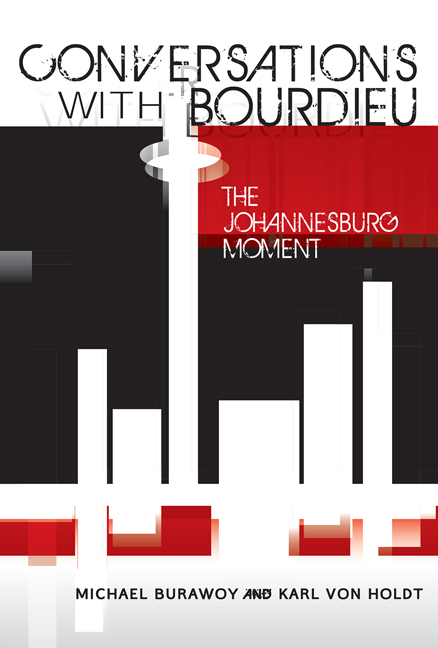Book contents
- Frontmatter
- Contents
- Abbreviations and acronyms
- Preface
- Prologue The Johannesburg Moment
- Acknowledgements
- CONVERSATION 1 SOCIOLOGY AS A COMBAT SPORT
- CONVERSATION 2 Theory and Practice
- CONVERSATION 3 CULTURAL DOMINATION
- CONVERSATION 4 COLONIALISM AND REVOLUTION
- CONVERSATION 5 PEDAGOGY OF THE OPPRESSED
- CONVERSATION 6 THE ANTINOMIES OF FEMINISM
- CONVERSATION 7 INTELLECTUALS AND THEIR PUBLICS
- Mills Meets Bourdieu
- The Symbolic World of Politics
- CONVERSATION 8 MANUFACTURING DISSENT
- Epilogue Travelling Theory
- Bibliography
- Index
The Symbolic World of Politics
from CONVERSATION 7 - INTELLECTUALS AND THEIR PUBLICS
Published online by Cambridge University Press: 20 April 2018
- Frontmatter
- Contents
- Abbreviations and acronyms
- Preface
- Prologue The Johannesburg Moment
- Acknowledgements
- CONVERSATION 1 SOCIOLOGY AS A COMBAT SPORT
- CONVERSATION 2 Theory and Practice
- CONVERSATION 3 CULTURAL DOMINATION
- CONVERSATION 4 COLONIALISM AND REVOLUTION
- CONVERSATION 5 PEDAGOGY OF THE OPPRESSED
- CONVERSATION 6 THE ANTINOMIES OF FEMINISM
- CONVERSATION 7 INTELLECTUALS AND THEIR PUBLICS
- Mills Meets Bourdieu
- The Symbolic World of Politics
- CONVERSATION 8 MANUFACTURING DISSENT
- Epilogue Travelling Theory
- Bibliography
- Index
Summary
Bourdieu writes about the ‘Realpolitik of reason’ or the ‘Realpolitik of the universal’ as the form of politics engaged in by the public sociologist – in other words, the struggle to defend the social conditions of the exercise of reason and expand access to its fruits. What might this mean in a country such as South Africa, emerging from a long history of colonialism and apartheid into a world order still dominated by the West?
As we noted in Conversation 5 (p121), Bourdieu understands the ‘ambiguity of reason’: on the one hand, it is a form of symbolic capital that serves ‘as an instrument of domination and legitimation’ for injustice and inequality; on the other, it is the basis of emancipation, democracy and human rights. Bourdieu argues for mobilisation and struggle through which those who are denied access to the universal can claim and realise such access (2000 [1997]: 70–72, 77–80), but his formulations are elliptical. What might they mean in practice? And what might they mean in a country of the Global South?
Bourdieu's text conveys a sense of the social scientist whose scholarship provides a unique access to the truth, which, as public intellectual, he conveys to society from his lectern – but at the same time the symbolic weight of the lectern and of his professorial knowledge serves to legitimate the existing authorities and hierarchies of society. There is little sense here of knowledge gained through concrete practice, which is consistent with Bourdieu's distinction between the logic of theory and the logic of practice. The impression is reinforced by the closing scenes of the documentary film on his life and work, La sociologie est un sport de combat, in which he attempts to persuade a militant meeting of immigrant community members in France that they cannot understand their own situation and should therefore read works of sociology – which they angrily reject, asserting the clarity of their own understanding of their oppression as they do so.
This is almost the public sociologist as parody. Any sociologist in South Africa who in the times of struggle against apartheid attempted such a role would have been met with a similar response.
- Type
- Chapter
- Information
- Conversations with BourdieuThe Johannesburg Moment, pp. 169 - 174Publisher: Wits University PressPrint publication year: 2012



